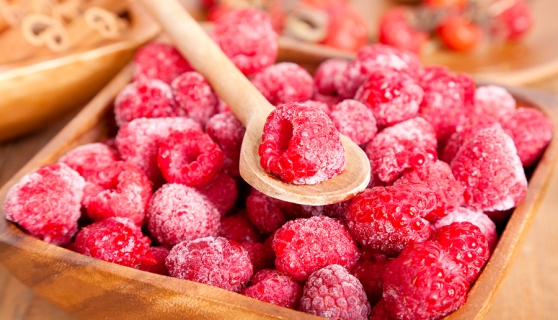
Berry fruits such as raspberries freeze well, providing antioxidant-rich goodness year round.
We all know the best way to eat produce is straight from the garden or farm. Nutrients start to break down when fruit and vegetables are harvested, with C and some B vitamins such as thiamin decreasing particularly quickly, so the fresher they are the better. Eating food grown under local conditions also allows us to absorb more of the micro-nutrients and organisms such as bacteria, etc. that help us to adapt to and thrive in our environment.
But obviously this is not always possible and most of us turn to canned or frozen options at some point. However, canned foods tend to lose nutrition during the preserving process. There are some exceptions like canned tomatoes, which usually have higher beta-carotene and lycopene, probably due to the heating during processing, but there is still the problem of toxic BPA in the can lining. Frozen foods, on the other hand, can actually be healthier overall than fresh items.
While the initial blanching to kill parasites and stop enzymatic breakdown (a key issue for raw fooders) does damage water-soluble nutrients like vit C, other good stuff is locked in with the flash freezing. And as fruit and vegetables destined for the freezer are usually picked when fully ripe, they should be at their most nutritious. This contrasts with a lot of “fresh” produce that is picked before it is ready and then held in cool stores and supermarket shelves for days or even weeks.
Selecting quality frozen produce
Obviously the final quality of frozen food depends on many things. Properly prepared organic fruit and vegetables will be healthier than mega-farm produce that may have extra sugar or salt added to maintain the color and flavor. This preparation process is highly important. Freezing kills some but not all bacteria, yeasts, molds, etc. – bacteria have been found in the Antarctic – and consuming exotic organisms can leave you feeling green in the wrong way. Conversely, overheating will cause nutrient damage.
I know first-hand that some of the fruit that goes into yogurt and frozen purees, concentrates, etc. isn’t exactly top quality. As a university student, I worked on an orchard where one job involved cutting the rotten, bug eaten and otherwise damaged bits out of fruit before it was sent for processing. I never really ate commercial yogurt again after that.
Generally though, when fresh, ripe fruit and vegetables are not available, frozen is a good choice. But remember to eat them fairly soon after purchase. In a home freezer, nutrients will still continue to oxidize and degrade – just at a much slower rate. Unlike animal products, produce can usually be defrosted and refrozen safely but the flavor and texture are likely to suffer.
If you’re still not convinced about freezing, Russian scientists recently managed to grow flowers from fruit that had been frozen for 32,000 years (link below). The seeds were buried by an ancient squirrel so not exactly an antiseptic environment originally. There is also Norway’s Svalbard Global Seed Vault, where scientists have spent years freezing hundreds of thousands of seeds as a back-up against agricultural crises.
Other details and resources
Abstract outlining the regeneration of fertile plants from 30,000 year old fruit
Norway’s Svalbard Global Seed Vault: Home page and media page

I LOVE that picture! Yea I eat a lot of frozen stuff even in summer. Its too easy. Thanks I feel so much less guilty now 😉
You’re welcome, Daniella. All part of the service. Natcom is a guilt-free zone. 🙂
Thanks for helping me the other day Kym. I bottle our fruit each Summer. The neighbors usually end up with some and we eat the other. Cans always taste funny to me.
You’re welcome, Edith. Yes, if you can taste the taint of metal, you probably don’t want to eat whatever it is. There’s definitely been some leaching there.